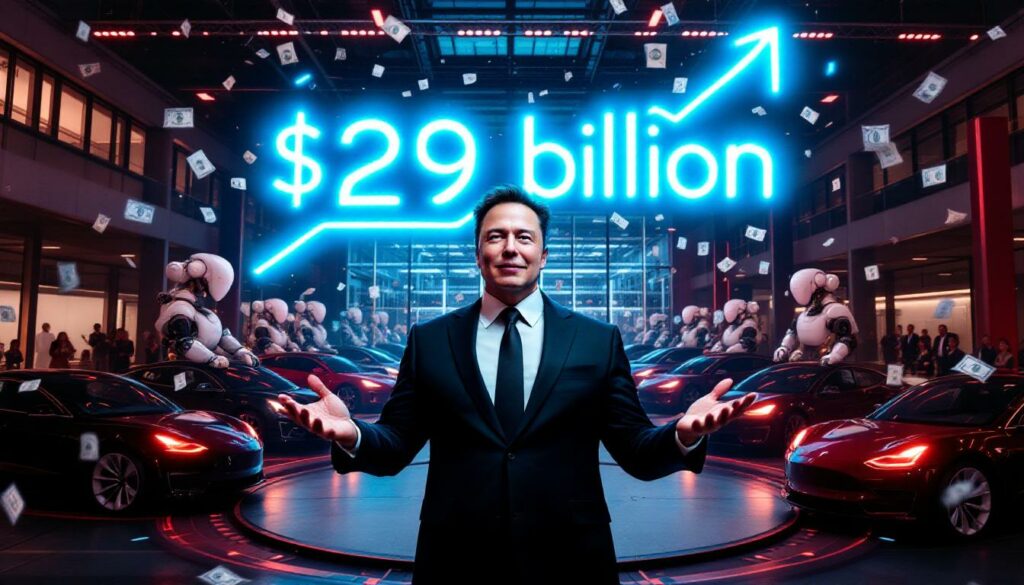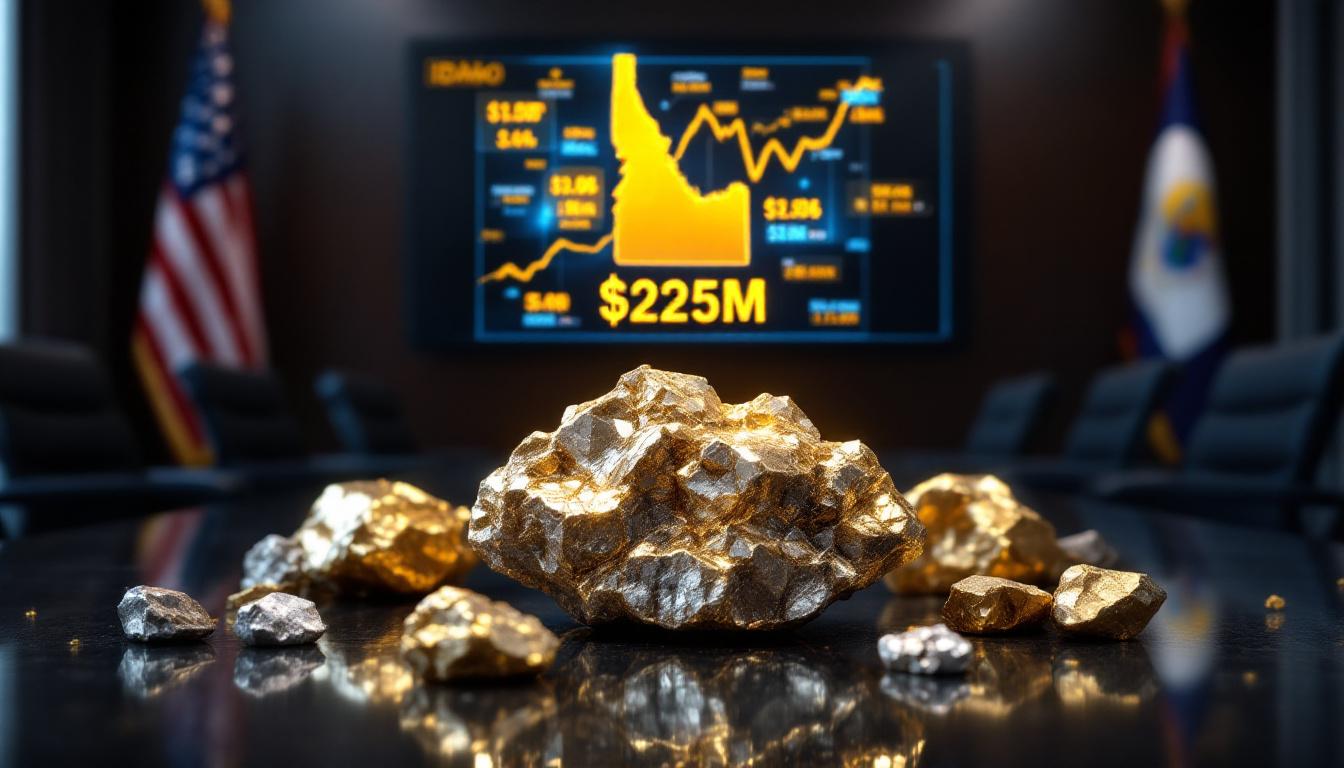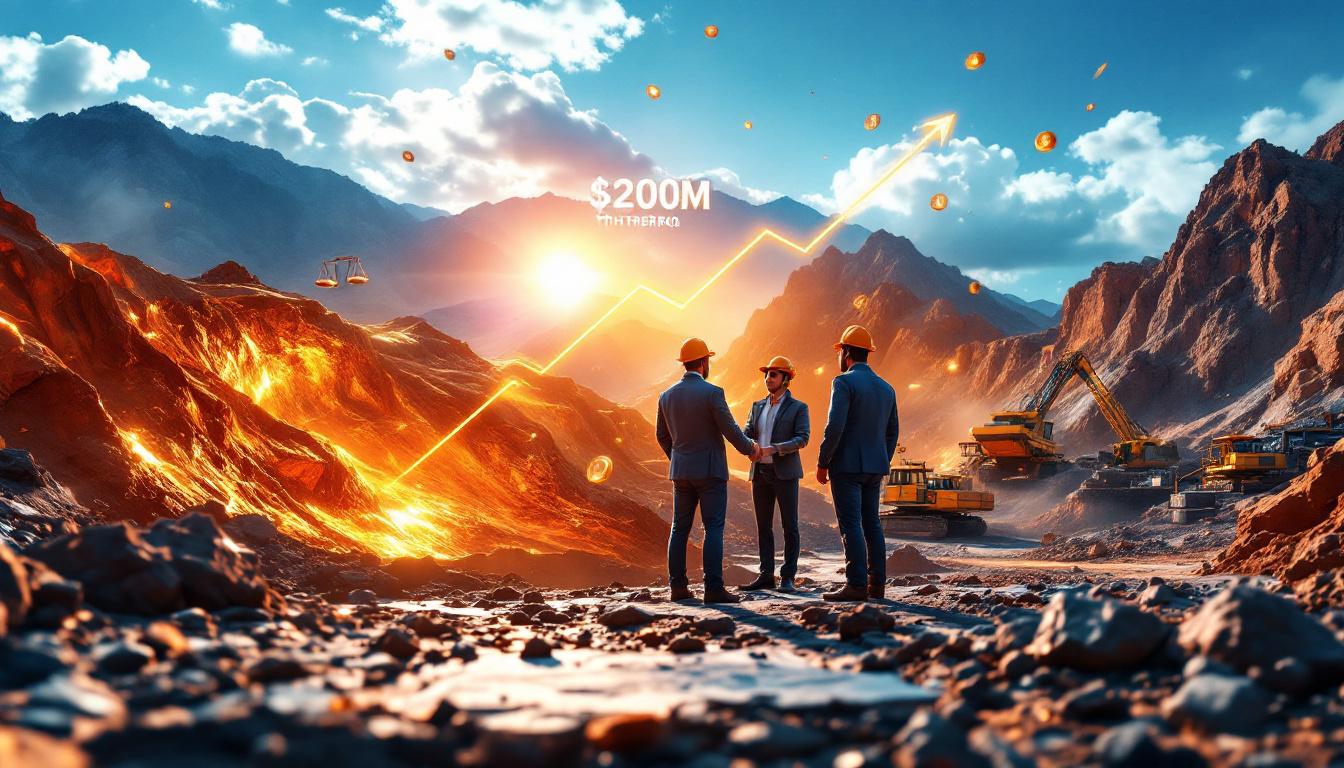Why Was Tesla's $29 Billion Share Award for Elon Musk Approved?
Tesla's board recently approved a staggering $29 billion share award for CEO Elon Musk, representing one of the largest executive compensation packages in corporate history. This decision comes at a critical juncture for the electric vehicle manufacturer, as it faces increasing competition and market pressures while trying to secure the continued leadership of its visionary founder.
The approval reflects the board's determination that Musk's ongoing leadership is essential to Tesla's future success, despite controversy surrounding his divided attention among multiple companies and his sometimes unpredictable management red flags.
The Unprecedented Compensation Package Explained
The newly approved package consists of approximately 96 million shares, valued at roughly $29 billion based on Tesla's current stock price. This substantial equity grant is designed not only as compensation for Musk's leadership but primarily as a retention mechanism during a period of intense market competition and technological transition in the automotive industry.
What makes this package particularly notable is its magnitude relative to typical executive compensation. Most CEO compensation packages at major corporations range from tens to hundreds of millions—not tens of billions. This extraordinary sum highlights both Tesla's unorthodox approach to executive rewards and the board's assessment of Musk's unique value to the company.
Industry Context: Executive compensation at this scale is exceedingly rare, even among technology giants. The next largest CEO packages typically fall below $1 billion, making Tesla's approach a significant outlier in corporate America.
What Led to This Massive Share Award?
The journey to this $29 billion package has been marked by legal battles, public posturing, and complex corporate governance issues that ultimately culminated in Tesla's board taking decisive action to secure Musk's continued involvement.
The Delaware Court Ruling and Its Aftermath
In January 2024, Delaware Chancery Court judge Kathaleen McCormick voided Musk's previous $56 billion pay package, ruling it was "unfair to shareholders" and "constituted an excessive compensation." The court determined that Tesla's board had failed in its fiduciary duty by approving such an enormous package without sufficient independence from Musk's influence.
Following this ruling, Musk publicly expressed his frustration through a series of posts on his social media platform X (formerly Twitter), stating that "I recommend incorporating in Nevada or Texas if you prefer shareholder choice." He subsequently initiated a shareholder vote to reincorporate Tesla in Texas, away from Delaware's corporate governance requirements.
The billionaire CEO also made numerous statements suggesting he might reduce his focus on Tesla without additional equity incentives, creating uncertainty about the company's leadership direction.
Retention Strategy in a Competitive Market
Tesla's board explicitly framed the new share award as a crucial retention tool. In their public statement, they emphasized: "It is imperative to retain and motivate our extraordinary talent, beginning with Elon," adding they were "confident this award will incentivize Elon to remain at Tesla."
This retention focus comes as Tesla faces mounting competitive pressure from both traditional automakers ramping up their electric vehicle offerings and new entrants, particularly Chinese manufacturers like BYD, who have rapidly gained market share. In this environment, the board appears to have calculated that the cost of potential leadership instability outweighs the dilution effect of issuing new shares.
Expanding Musk's Ownership Stake
The 96 million new shares will increase Musk's ownership position from approximately 13% to 16% of Tesla's outstanding stock. This ownership expansion strengthens his position as the company's largest individual shareholder and significantly enhances his voting power on strategic decisions.
For Musk, who has repeatedly stated his belief in having "skin in the game," this increased ownership aligns with his preference for equity-based compensation over traditional salary arrangements. In fact, Musk does not take a regular salary from Tesla, instead tying his financial rewards directly to the company's market performance analysis through stock awards.
How Does This Award Compare to Previous Compensation Packages?
To understand the significance of this new compensation package, it's important to place it in the context of both Musk's previous arrangements with Tesla and broader industry standards for executive compensation.
Historical Context of Executive Compensation
While the $29 billion award is substantial by any measure, it actually represents a reduction from Musk's previous $56 billion package that was invalidated by the Delaware court. That earlier package, approved in 2018, had been structured around twelve ambitious performance milestones that Tesla largely achieved under Musk's leadership, driving the company's market capitalization from approximately $50 billion to over $800 billion at its peak.
The scale of both packages dwarfs typical CEO compensation at other major corporations:
| Company | CEO | Recent Annual Compensation | Format |
|---|---|---|---|
| Tesla | Elon Musk | $29 billion (new package) | Stock award |
| Apple | Tim Cook | $99 million (2022) | Mixed salary/stock |
| Microsoft | Satya Nadella | $55 million (2022) | Mixed salary/stock |
| JPMorgan Chase | Jamie Dimon | $34.5 million (2022) | Mixed salary/bonus |
| General Motors | Mary Barra | $29 million (2022) | Mixed salary/stock |
Performance-Based Compensation Structure
Unlike traditional salary-based executive compensation, Tesla's approach with Musk has consistently tied rewards directly to company performance and shareholder value creation. The previous package included no guaranteed compensation whatsoever—Musk would receive the promised shares only if Tesla achieved specific revenue, profitability, and market capitalization targets.
While the full details of performance requirements attached to the new share award haven't been completely disclosed, Tesla's history suggests this package likely includes similar investment strategy trends. This approach aligns with the company's long-standing philosophy of incentivizing ambitious growth targets rather than providing guaranteed compensation regardless of outcomes.
Compensation Philosophy: Tesla's approach represents a stark contrast to traditional executive compensation models that often provide substantial guaranteed compensation regardless of company performance. The performance-based structure potentially creates stronger alignment between executive rewards and shareholder interests.
What Challenges Is Tesla Currently Facing?
The timing of this massive compensation package coincides with a period of significant challenges for Tesla, which may help explain the board's willingness to approve such an extraordinary sum to ensure leadership stability.
Market Position and Sales Trends
Tesla is experiencing concerning sales trends in several key markets. In the first quarter of 2024, the company reported a 8.5% year-over-year decline in vehicle deliveries, marking its first annual sales decline since 2020. This downturn reflects several market dynamics:
- Increasing competition: Traditional automakers like Volkswagen, GM, and Ford have expanded their electric vehicle offerings, while Chinese manufacturers like BYD are gaining significant market share.
- Market saturation: Tesla's existing models (particularly the Model 3 and Model Y) are aging without substantial updates, potentially saturating their target markets.
- Economic headwinds: Higher interest rates have increased financing costs for consumers, particularly impacting the premium vehicle segment where Tesla primarily competes.
In Europe specifically, Tesla has lost market share for three consecutive quarters, with BYD surpassing the company in global EV sales during the fourth quarter of 2023.
Leadership Uncertainty
The ongoing saga regarding Musk's compensation has created significant uncertainty about the company's leadership stability. While Musk remains Tesla's public face and strategic visionary, his attention has been increasingly divided among his multiple ventures:
- SpaceX, his aerospace company
- X (formerly Twitter), which he acquired in 2022
- The Boring Company, focused on tunnel construction and infrastructure
- Neuralink, developing brain-computer interfaces
- xAI, his artificial intelligence venture
These competing priorities have raised legitimate questions about Musk's capacity to focus on Tesla's operational challenges, particularly as the company faces its first serious competitive threats in the electric vehicle market.
Political Complications
Musk's increasingly visible political activities have introduced additional complications for Tesla. Once celebrated across the political spectrum for his entrepreneurial vision and environmental focus, Musk has become a more polarizing figure, potentially affecting Tesla's brand perception among different consumer segments.
His public criticism of the Biden administration's policies, particularly regarding electric vehicle subsidies and regulatory approaches, has potentially complicated Tesla's position in the U.S. market at a time when government support for EV adoption remains crucial to industry evolution trends.
How Has the Market Responded?
The market's reaction to Tesla's $29 billion award announcement provides important insights into investor sentiment regarding both the compensation package itself and the company's broader trajectory.
Immediate Stock Performance
Following the announcement of the new share award, Tesla's stock price increased by 2.58% in pre-market trading to $309.38, suggesting initial investor relief that the leadership uncertainty might be resolved. However, this modest gain occurred against a backdrop of significant stock underperformance in 2024, with Tesla shares down approximately 20% year-to-date at the time of the announcement.
This context is crucial for understanding investor sentiment—while the market responded positively to the prospect of leadership stability, underlying concerns about Tesla's competitive position and growth trajectory appear to be weighing on the stock's performance.
Analyst Perspectives
Wall Street analysts remain deeply divided on the implications of this compensation package:
Positive perspectives:
- "Musk's leadership premium is real. Tesla without Elon would likely trade at a significantly lower multiple, potentially justifying the dilution cost of this retention package." – Dan Ives, Wedbush Securities
- "The package addresses a key overhang on the stock—uncertainty about Musk's commitment to Tesla amid his multiple other ventures."
Skeptical perspectives:
- "The dilution effect of issuing 96 million new shares is substantial and comes at a time when Tesla's growth narrative is already under pressure."
- "This reinforces concerns about Tesla's corporate governance, with the board appearing to prioritize Musk's demands over broader shareholder interests."
Market Psychology Note: Tesla's stock performance has historically been driven as much by narrative and future potential as by current financial metrics. The compensation package appears designed partly to reinforce the narrative that Musk remains committed to Tesla's long-term vision despite his other ventures.
What's Next for Tesla Under Musk's Leadership?
With this compensation issue potentially resolved, attention now turns to Tesla's strategic priorities and how Musk plans to address the company's competitive challenges.
Strategic Priorities
Tesla has identified several key initiatives that will likely define its next phase of growth:
The "affordable" Tesla model: Perhaps most critically, Tesla needs to develop and launch a more accessible vehicle model to boost sales volume and counter increasing competition. Musk has repeatedly hinted at a $25,000-$30,000 Tesla model, though timelines have remained fluid. Recent reports suggest this vehicle (sometimes referred to as "Model 2") could begin production in 2025.
Manufacturing innovation: Tesla continues to focus on manufacturing efficiency improvements through its "unboxed manufacturing" approach, which aims to simplify production processes and reduce costs. The company's goal of reducing manufacturing costs by 50% remains central to its competitive strategy.
Full Self-Driving (FSD) advancement: Despite repeated delays and regulatory scrutiny, Tesla continues to invest heavily in its autonomous driving technology. Musk has consistently positioned FSD as a transformative capability that could dramatically increase Tesla's value proposition and enable new business models like robotaxis.
Energy business expansion: Beyond vehicles, Tesla's energy generation and storage business represents a significant growth opportunity. The company's solar roof, Powerwall, and utility-scale Megapack products address the broader sustainable energy ecosystem that complements its vehicle offerings.
Balancing Multiple Ventures
A key challenge for Tesla moving forward will be ensuring Musk's adequate attention despite his involvement with multiple other ventures. Investor concerns about his divided focus intensified following his acquisition of Twitter (now X) in 2022, which appeared to consume significant management bandwidth during a critical period for Tesla.
The new compensation package may partly address this concern by providing explicit financial incentives for Musk to prioritize Tesla. However, the practical reality of his multiple leadership roles remains a potential risk factor for Tesla shareholders.
Manufacturing and Innovation Focus
With renewed commitment from Musk, Tesla is expected to accelerate innovation in several key areas:
Battery technology: Tesla continues to pursue advances in battery chemistry, cell design, and manufacturing processes to improve energy density, reduce costs, and enhance vehicle range.
Gigafactory expansion: The company's global manufacturing footprint continues to grow, with potential new facilities being considered to support expansion into new markets and product categories.
Artificial intelligence applications: Beyond autonomous driving, Tesla is leveraging its AI expertise across various aspects of vehicle design, manufacturing, and user experience.
What Does This Mean for Corporate Governance?
The approval of such a substantial compensation package raises important questions about corporate governance standards and the appropriate balance of power between founders, boards, and shareholders.
Precedent for Executive Compensation
The scale of Tesla's compensation arrangement with Musk potentially sets a precedent for other companies, particularly in the technology sector where founder-CEOs often wield outsized influence. While few executives possess Musk's unique combination of technical expertise, strategic vision, and public persona, the Tesla package could influence expectations among other high-profile business leaders.
This raises broader questions about sustainable approaches to executive compensation and whether the concentration of such enormous wealth in a single leader ultimately serves long-term corporate interests and economic equity.
Shareholder Rights and Board Independence
The compensation saga highlights tensions between different corporate stakeholders:
Institutional shareholders: Major institutional investors, including some pension funds, have questioned whether Tesla's board is sufficiently independent from Musk's influence to represent broader shareholder interests effectively.
Retail investors: Tesla has an unusually large and passionate retail investor base, many of whom strongly support Musk's leadership and vision despite governance concerns.
Board composition: Tesla's board has faced criticism for including members with close personal or professional ties to Musk, potentially compromising their independence in compensation decisions.
These dynamics reflect a broader debate in corporate America about the appropriate governance model for founder-led companies, particularly those with visionary leaders who have delivered exceptional historical returns but may also present unique governance challenges.
Legal Implications
Following the Delaware court's previous ruling invalidating Musk's earlier compensation package, this new arrangement will likely face intense legal scrutiny. Potential areas of legal vulnerability include:
- The board's process for determining the appropriate compensation amount
- Disclosures to shareholders regarding the package's terms and justification
- The independence of board members involved in the approval process
- Compliance with various state corporate governance standards
Given the high profile of both Tesla and Musk, this compensation package may become a reference case in ongoing debates about appropriate limits on executive rewards and the legal standards for board decision-making.
How Might This Impact Tesla's Future?
The long-term implications of this compensation decision will ultimately be judged by Tesla's performance in the coming years and whether Musk's continued leadership delivers value that justifies the substantial cost to shareholders.
Stabilizing Leadership
The primary intended benefit is leadership stability during a critical period of market competition and technological transition in the automotive industry. By addressing Musk's compensation demands, Tesla's board aims to secure his continued focus and commitment during a challenging competitive phase.
This stability could prove particularly valuable as Tesla navigates several major transitions:
- The development and launch of new vehicle models
- Expansion into new market segments and geographic regions
- Advancement of autonomous driving technology
- Scaling of energy generation and storage businesses
Financial Implications
The issuance of 96 million new shares represents significant dilution for existing shareholders—approximately 3% based on Tesla's current outstanding share count. This dilution effectively transfers wealth from existing shareholders to Musk, a transfer the board presumably believes is justified by the value his leadership adds to the company.
From a financial perspective, the key question becomes whether Musk can drive sufficient value creation to offset this dilution cost. Based on Tesla's historical performance under his leadership, the board appears to have concluded that the potential upside outweighs the dilution cost.
Long-term Strategy Execution
With his position secured, Musk is expected to focus on executing Tesla's broader vision of sustainable energy and transportation. This vision extends beyond simply selling electric vehicles to transforming multiple industries:
- Automotive: Continuing to lead the transition to sustainable transportation through electric vehicles and autonomous technology
- Energy: Expanding solar generation, battery storage, and grid services to accelerate the transition to renewable energy
- AI and robotics: Leveraging Tesla's expertise in artificial intelligence and manufacturing to potentially enter new product categories
The success of this expansive vision will ultimately determine whether the $29 billion compensation package represents a sound investment in Tesla's future or an excessive reward that prioritized one individual over broader investment opportunities insights.
Disclaimer: This article contains analysis of public information and market perspectives. It does not constitute financial advice. Investors should conduct their own research and consult qualified financial advisors before making investment decisions regarding Tesla or any other security.
FAQs About Tesla's $29 Billion Share Award
How does Musk's compensation compare to other CEOs?
The $29 billion award far exceeds typical CEO compensation packages, which generally range from tens to hundreds of millions of dollars for major corporations. Even by the standards of the technology sector, where equity-based compensation is common, the scale of this package is extraordinary.
Will this award guarantee Musk stays at Tesla?
While designed as a retention mechanism, the award doesn't contractually obligate Musk to remain at Tesla for any specific period. The financial incentives are substantial, but Musk has demonstrated throughout his career that his decisions are driven
Ready to Spot the Next Major ASX Discovery?
Discover how to gain an immediate market edge when mineral discoveries are announced using Discovery Alert's proprietary Discovery IQ model, which provides instant notifications on significant ASX discoveries and transforms complex mineral data into actionable insights. Explore why major mineral discoveries can lead to substantial returns by visiting the Discovery Alert discoveries page and begin your 30-day free trial today.




